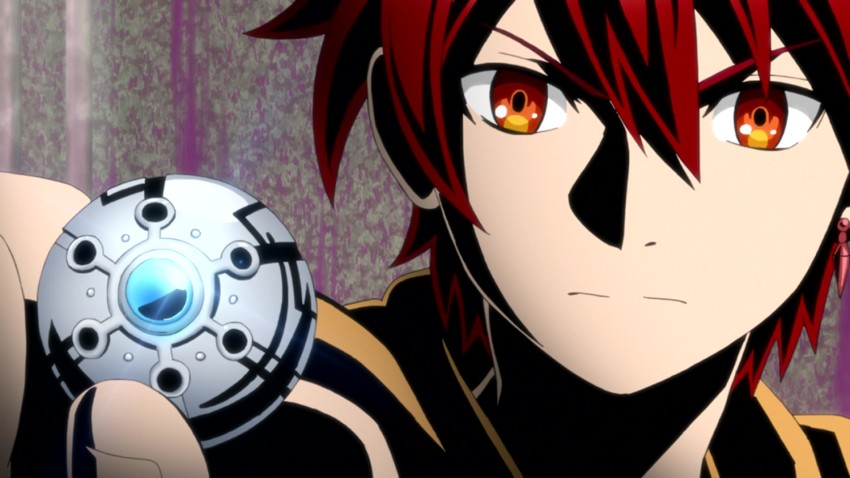Divine Gate
December 15, 2019 · 0 comments
By Andrew Osmond.
 Noriyuki Abe, the long – very long – serving director of Bleach, offers up the new series Divine Gate. Handsomely visualized by Bleach’s studio Pierrot, and based on a smartphone game, Divine Gate is the kind of anime that can look impenetrably complex when you look at some of its synopses online, but it turns out to be straightforward. Actually its approach to world-building is pretty smart.
Noriyuki Abe, the long – very long – serving director of Bleach, offers up the new series Divine Gate. Handsomely visualized by Bleach’s studio Pierrot, and based on a smartphone game, Divine Gate is the kind of anime that can look impenetrably complex when you look at some of its synopses online, but it turns out to be straightforward. Actually its approach to world-building is pretty smart.
On the one hand, it brings in lots of story elements that you’ll know immediately if you’ve been following TV anime in recent years. In effect, Divine Gate relies on an informal shared universe of story ideas, not far from the ones studios spend billions building for superheroes. On the other hand, Gate sets up plenty of mysteries about the specifics of its world – fabled artefacts, hidden histories – to take its characters through the story.
Divine Gate is set in a world that’s been smooshed together with other non-human dimensions – the kind of set-up that underpins anime like Darker than Black and Blood Blockade Battlefront. The upshot is a world where non-humans mingle with humans, and humans themselves can have paranormal powers, but it’s like our world, too. The setting, it’s soon clear, is Japan; one of the side-stories is about a character growing up in the country, and this is presented like a zillion non-fantasy rural dramas, with kimonos and summer festivals.
Divine Gate also concerns youngsters with special powers, such as the ability to wield fire or water in combat. Following a template that goes far beyond anime, the characters must be trained in such powers, though there are still loners like blank-faced, blue-eyed Aoto, one of the main characters. The boy inadvertently shows his water-wielding powers to stop a maniacal killer on a tram, and he’s seen by two other youngsters, girl Midori and boy Akane, both part of their world’s “Academy.” Midori and Akane are friends but not any kind of item, which doesn’t stop Akane getting vexed when Midori becomes curious about Aoto.
Aoto lives alone, wants to be alone, and has a murky past; he’s rumoured to have killed his parents as a child and committed even worse atrocities. He also has an invisible friend, a cheery little boy only he sees, who’s voiced in Japanese by the well-known woman actor Rie Kugimiya who’s best-known as Al in Fullmetal Alchemist. The contrast between this happy “ghost” child – who smiles even when he expresses Aoto’s dark feelings – and the grim teenager he counsels is potent in anime; the titles of last year’s Attack on Titan were built round a similar idea.
There are other anime echoes. A past atrocity called Blue Christmas, for which Aoto is blamed, may remind many viewers of Blue Night in the backstory of Blue Exorcist. Divine Gate is also overtly about socialising youngsters, about the fears and pitfalls that an outside like Aoto faces in forming bonds and relationships. It’s a universal theme, but is especially highlighted today in much anime by Mari Okada (Kiznaiver, Anthem of the Heart). Of course, Midori’s interest in Aoto fuels some handy tensions with “rival” boy Akane, as well as motivating her to delve deeper into Aoto’s suspiciously sealed-from-the-public past.
The show’s other big enigma involves the titular Divine Gate, a fabled artifact that’s said to grant wishes but is also linked to the Japanese legends of kamikakushi, of people being “spirited away” from the world. More than one of the teens has a deeply personal stake in finding the gate for themselves. Naturally this involves fighting, stirring in both magic forces and hi-tech (have a drink when the girl android appears).
It also stirs in a large support cast. Many of the players are named after Arthurian or Norse figures, including an inevitably wily Loki. The more miscellaneous jokers range from Hamlet to Santa Claus, with shades of the berserk Sunrise anime Horizon on the Middle of Nowhere. But don’t let them freak you out! It’s easy to tune that lot out and focus on the sturdy teen story.
Andrew Osmond is the author of 100 Animated Feature Films.
Divine Gate is streaming on FunimationNow.
Leave a Reply